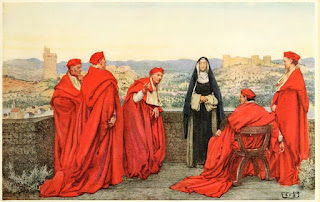During a 1374 visit to Florence, she made the acquaintance of Raymond of Capua, chaplain of a second order monastery of Dominican nuns. While nursing plague victims, he became ill; Catherine sat by his side during his recovery, which he attributed to her prayers.
They began a close relationship, and he became her confessor and spiritual advisor, traveling with and advising her. Catherine traveled around northern and central Italy, urging reform of the clergy. She convinced the cities of Pisa and Lucca to avoid an alliance with an anti-papal movement. She wrote to John Hawkwood, trying to persuade him to turn his energy to supporting God.
She had a long correspondence with Pope Gregory XI, which included urging him to return the papal headquarters from Avignon back to Rome, which he eventually did. Not all cardinals approved of the return, and when Gregory died a few years later, two competing groups of cardinals—in in Rome, one still in Avignon—each elected a pope, resulting in what is called the Western Schism. Such was her perceived influence that Catherine went to Rome at the request of Pope Urban VI to support his legitimacy. Unfortunately for Urban, her support was not sufficient.
Catherine's habit of extreme fasting was very unhealthy, and Raymond admonished her to eat more, but she refused. In 1380 she lost the ability to swallow easily. She suffered a stroke and lost the use of the lower half of her body. She died on 29 April 1380.
Although she was buried in Rome, her head was placed in a bronze bust and taken to Siena. It was carried through the city in a procession to the Basilica of San Domenico, accompanied by her then 89-year-old mother. Her mother and Raymond of Capua collaborated on her biography. She was named a Doctor of the Church in 1970 by Pope Paul VI in recognition of her pious example and her treatise The Dialogue of Divine Providence.
About this Western Schism, during which she was unsuccessful in convincing everyone to accept Urban as the legitimate pope: his opponent didn't succeed either. I should say opponents, because Avignon and Rome weren't the only cities to name a pope. That story is for next time.
